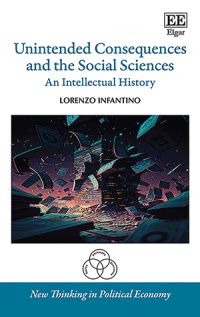
According to Western tradition, the concept of the unintended consequences of human actions harks back to ancient times, to the complex dialectics between men and gods. It was etched in the myths and stories of Oedipus, who unconsciously killed his father and bedded his mother, and yet, despite the “innocence” of the lack of knowledge, felt and was guilty nonetheless.
Yet it was all forgotten after the Platonic gnoseological revolution that presumed the ability of some enlightened people to muster all necessary knowledge to rule a state.
The concept came back in the 17th and 18th centuries with the birth of a new type of knowledge, social science, that propelled the West and the world to the Industrial Revolution and modernity.
In his seminal work Unintended Consequences and the Social Sciences (Edward Elgar Publishing), Lorenzo Infantino traces the early evolution of the concept underpinning the contemporary free society. The idea won slow acceptance in Europe, and from there, in the world, it is still unabashedly challenged by those trying to sway institutions in the hands of a chosen few.
At a time when liberal values are disputed and doubted, when the world is in the middle of a new unprecedented confrontation, Infantino’s work is crucial to understanding what is at stake and what motored the present global wealth.
Gradually, through contributions that went through de Mandeville, Hume, Montesquieu, Adam Smith, and a few others, the European world of those two centuries acquired an awareness that every single human has only limited knowledge. Therefore, anybody trying to monopolize power, and thus knowledge, will smother and ultimately suffocate people’s ingenuity, propelling growth and innovation.
Infantino describes it so: “It was felt that the refusal to base social order on intentions (and their control by an invisible population, placed beyond proofs and refutations) would plunge collective life into irreversible chaos and render it impossible for human actions to be made compatible with each other… Voluntary exchange brings each of us to cooperate unintentionally in the achievement of the aims of others. There is no need for a mandatory hierarchy of ends; and there is no need for a privileged source of knowledge to legitimize such a hierarchy: we are all ignorant and fallible.”
With this new conscience came a different approach to law: “We are confronted by radically different ways of delimiting the boundaries between actions. The normative habitat changes. In the former case, what is “just” is imposed (and the individual has no autonomy); in the latter case, what is “unjust” is prevented (and the rest is left to the choice of the actor). It is an issue that Hume understood perfectly. This explains, even if his philosophy of law has been (and is) often neglected, his insistence on the need to replace the “government of men” (and/or divinities) with the “government of the law,” a need that did not escape Montesquieu and that was very clear to Smith, who wanted, as we know, to write a work on the theory of law, a project confirmed even at the time when the thread of his life was about to snap.”
It was a radical revolution from the times when kings told people what to do and didn’t simply limit what not to do. In the new way, the new leaders limited their power and yet unleashed the power of the people.
It was a political revolution grounded on understanding the paradox of any society. The fallibility of each man makes social intercourse necessary and at a positive sum. Without fallibility, social ties would be useless. Everybody would live in total isolation. Still, these ties are complex, have frictions, and are based on the composition of clashes of differing ends. But the realization that unintended consequences are not a tragedy, like that of ancient Greek times, but a welcome result changed everything and ushered in modernity.
The twist, the inspiration in understanding this paradox may have come from China. Infantino notes that Tocqueville pointed out that “they went to the heart of Asia in search of a model. I do not exaggerate when I affirm that every one of them wrote in some place or other an emphatic eulogium on China. One is sure to find at least that in their books; and as China is very imperfectly known even in our day, their statements on its subject are generally pure nonsense.”
It was a time when China was the model to follow for Europe, although very little was known of the country and very much was misunderstood about it. Still, it might have been the Taoist concept of wuwei, the non-action that is action, that made the early French thinkers see the positive paradox of the clash of all selfish interests. After all, 17th century France was most exposed to the Chinese translations coming from the Jesuits.
Many other elements were also at play. There was the “invention” of science, as David Wootton argued in his book, that came from the introduction of the concept of discovery, which in turn arose from the revolutionary “discovery” of the American continent.
There was the rise of a new entrepreneurial class that first engineered the exploitation and integration of new geographical and technological discoveries in a European-centered world. There was the invention and evolution of financial markets and monetary instruments that gradually freed exchange from its traditional metallic base.
But the keystone remains a radical conceptual revolution, distrusting monopolies of power and knowledge and accepting the unintended consequences of human interactions as a positive result.
Presently, to deny it, going back to the concentration of power of authoritarian regimes would ultimately stifle freedom and unscrew the nuts and bolts of modernity. It would not only make everybody a slave but would also ultimately impoverish everybody but a privileged few on top.





